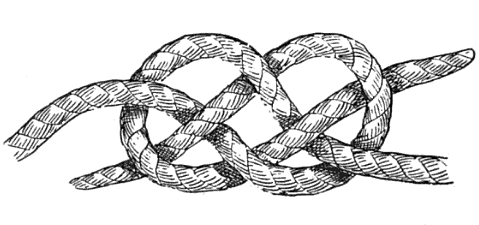“A man cannot be comfortable without his own approval.” — Mark Twain
“A man who finds not satisfaction in himself, seeks for it in vain elsewhere.” — La Rochefoucauld
“Nothing can bring you peace but yourself.” — Emerson
“A man cannot be comfortable without his own approval.” — Mark Twain
“A man who finds not satisfaction in himself, seeks for it in vain elsewhere.” — La Rochefoucauld
“Nothing can bring you peace but yourself.” — Emerson

In 1907 an anonymous turner produced a vase that threw a shadow of Queen Victoria.
Seventy years later, for the Silver Jubilee in 1977, a vase was produced that evoked the profiles of both Prince Philip and Elizabeth II.
Is this a tradition? It might lead us to see too much.
Founded by Daniel Dennett, the Philosophical Lexicon converts philosophers’ surnames into useful words (with often pointed definitions):
And, inevitably, dennett: “To while away the hours defining surnames.”
‘What I am saying cannot be proved.’
Suppose this statement can be proved. Then what it says must be true. But it says it cannot be proved. If we assume it can be proved, we prove it cannot be proved. So our supposition that it was provable is wrong. With that road closed to us, let’s try the only other one available — let’s suppose it cannot be proved. Since that is precisely what it says, then it is true after all. And this ends our proof of the above statement!
— Gary Hayden and Michael Picard, This Book Does Not Exist, 2009

What do you get when you drop a piano down a mineshaft?
A-flat minor.
In November 2003, Word Ways: The Journal of Recreational Linguistics challenged its readers to discover why Ed Wolpow had sent in the following poem:
ADIRONDACK SHINGLES
Among old and crafty mountain men,
Far gone in their heart-held dreaming,
Nearest neighbor one mile down a rock road,
Busy poking old and peeling car bonnets,
An owl hoots past a tin ear.
The sunny period in every week
Is time for one–one hoarse chuckle.
It’s not the place for foxy generals
Nor a spiffy consul, furtive, medalled.
No young and flaxen onlookers
With peach fuzz included.
Extant alumni of a meaner university
Plead for simple knots and bolts.
Home to fossil icons of steep hills,
And not fossil verses which gleam
With glib phrases that parse nicely,
A rogue element in every line.
The answer is that each line contains the name of an element.
A letter from Lewis Carroll to 14-year-old Wilton Rix:
Honoured Sir,
Understanding you to be a distinguished algebraist (i.e. distinguished from other algebraists by different face, different height, etc.), I beg to submit to you a difficulty which distresses me much.
If x and y are each equal to ‘1,’ it is plain that 2 × (x2 – y2) = 0, and also that 5 × (x – y) = 0.
Hence 2 × (x2 – y2) = 5 × (x – y).
Now divide each side of this equation by (x – y).
Then 2 × (x + y) = 5.
But (x + y) = (1 + 1), i.e. = 2.
So that 2 × 2 = 5.
Ever since this painful fact has been forced upon me, I have not slept more than 8 hours a night, and have not been able to eat more than 3 meals a day.
I trust you will pity me and will kindly explain the difficulty to
Your obliged, Lewis Carroll

“If you can describe clearly without a diagram the proper way of making this or that knot, then you are a master of the English tongue.” — Hilaire Belloc
In 1867, a Boston family paid its servant Bridget McDonald $38 in bank bills. A Martin O’Malley “asked her to let him take the money and count it, she not being able to read or write.” When she obliged, he refused to return the bills and threatened to burn them unless she opened the door. She did, and he went off with the money.
O’Malley was prosecuted for larceny, but the trial court seemed to feel that he was actually guilty of embezzlement, since he hadn’t taken the money from Bridget but merely kept it against her will. So it acquitted him.
A jury then convicted O’Malley of embezzlement, but he appealed — claiming that the act amounted to larceny. And apparently he went free.
(To prevent such injustices, many legislatures eventually combined larceny, embezzlement, and false pretenses into a single offense called theft.)
Suppose counterfeiting carried a mandatory life sentence. In the face of such a severe penalty, no one counterfeits, and thus the penalty is never imposed. This is a desirable outcome, and yet most of us would not wish to live in such a society. Why?
“A law can be unjust even if it is never applied,” writes Saul Smilansky. “But someone can hardly be a victim of unjust punishment when no punishment occurs!”